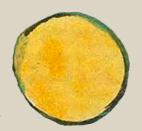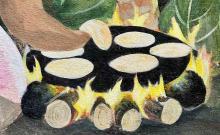comalli (Mdz16v)
This glyphic element showing a comalli (griddle) has been carved from the compound sign for the place name, Comaltepec. It is a simple circle with the interior painted yellow, the same color used for naming the color (coztic) in the Codex Mendoza. The outer black line still inadvertently shows some green paint because it was placed in the center of a tepetl glyph.
Stephanie Wood
This is not the usual color in this codex for ceramics, which is more of an orange (see comitl, for example), and the discrepancy is difficult to explain. The comalli (clay griddle) was always a fired ceramic prior to contact and still today in many homes. According to Berdan and Anawalt (1992, vol. 2, 164), the comalli was made from clay called tezoquitl (stone-mud) or comallalli (comal-earth). The comalli that appears in the Codex Mendoza on folio 60 recto rests on a classic three-stone hearth.
Stephanie Wood
c. 1541, but by 1553 at the latest
Stephanie Wood
griddle, cooking grill
This painting of a woman cooking tortillas on an Indigenous griddle (a comal, in Mexican Spanish today) is part of a mural by Humberto Guillermo Ibarra at the Casa de Cultura in downtown Jocotepec, Jalisco. Photo by S. Wood, 30 January 2025.

comal(li), clay griddle, https://nahuatl.wired-humanities.org/content/comalli
clay griddle
el comal
Stephanie Wood
Codex Mendoza, folio 16 verso, https://digital.bodleian.ox.ac.uk/objects/2fea788e-2aa2-4f08-b6d9-648c00..., image 43 of 188.
The Bodleian Libraries, University of Oxford, hold the original manuscript, the MS. Arch. Selden. A. 1. This image is published here under the UK Creative Commons, “Attribution-NonCommercial-ShareAlike 3.0 License” (CC-BY-NC-SA 3.0).




